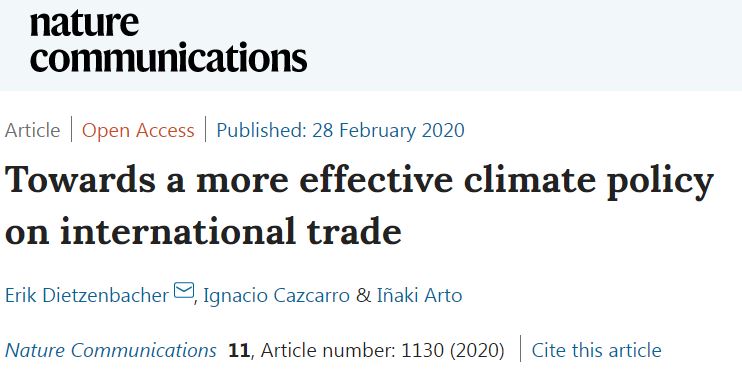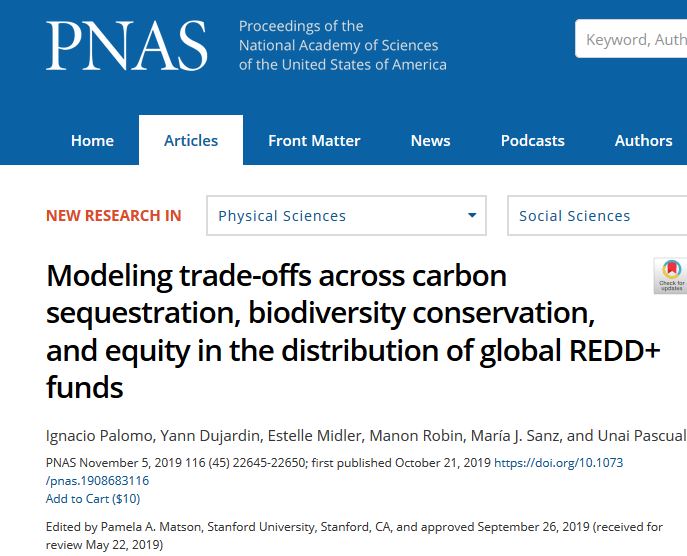Research
2 martxoa, 2020
Published by BC3Research Iñaki Arto at 2 martxoa, 2020
CO2 isurien erantzukizuna ekoizleen eta kontsumitzaileen artean esleitzea gai eztabaidagarria da klima aldaketaren politikan eta ikerketan. Bi kontabilitate metodo nagusi erabiltzen dira literaturan, herrialdeek emisio globalei egiten dieten ekarpena zehazteko. Ekoizpenean oinarritutako kontabilitateak (PBA) herrialde bateko industriek eta etxeek atmosferara askatutako CO2 kopurua neurtzen du. Kontsumoan oinarritutako kontabilitateak (CBA) herrialdearen amaierako produktuen kontsumoari egozten dizkio emisioak. PBA emisioak birbanatzen ditu CBAk, eta beste herrialde bateko emisioak jatorrizko herrialdearen kontsumorako beharrezkoak direla uste du. Bi kontabilitate-esparru horiek egungo CO2 isurien erantzukizuna esleitzeko erabiltzen dira. Ekoizpenaren ardura emisioak zuzenean sortzen dituzten herrialdeei zuzentzen zaie. Kontsumitzailearen erantzukizuna azken batean presioa bultzatzen duten herrialdeei zuzentzen zaie.
6 otsaila, 2020
Published by BC3Research Agustín del Prado Elisa Sainz de Murieta at 6 otsaila, 2020
Categories
Bideo infografiko hau BC3 - Basque Centre for Climate Changek Madrilgo COP25i egindako ekarpenaren zati gisa ekoitzi da (Espainiaren pabilioia-2019ko abenduaren 5a), H2020 iSAGE proiektuaren barruan.
Bideoa grafikoki ilustratzen saiatzen da zergatik hausnarkariek ez duten klima aldaketaren errua. Hainbat argudio daude hausnarkarien metano biogenikoaren emisioen eta erregai fosilen CO2 isurien arteko aldeei, ekoizpen-sistemetan dauden aldeei eta N2O isurketekiko ziurgabetasunei dagokienez, eta hausnarkarien emisioak beste jarduera batzuekin alderatzeko erreferentzia-lerroari dagokionez.
Bideoaren ideia eta gidoia Agustin del Pradok (BC3) eta Pablo Manzanok (Helsinkiko Unibertsitatea) garatu dute, Yelena Grigorenkok animatu eta ekoitzi dute eta Elisa Sainz de Murietaren (BC3) off -eko ahotsarekin.
11 azaroa, 2019
Published by BC3Research Ignacio Palomo Maria Jose Sanz Unai Pascual at 11 azaroa, 2019
The program on Reducing Emissions from Deforestation and Forest Degradation (REDD+) is one of the major attempts to tackle climate change mitigation in developing countries. REDD+ seeks to provide result-based incentives to promote emission reductions and increase carbon sinks in forest land while promoting other cobenefits, such as the conservation of biodiversity.
22 urria, 2019
Published by BC3Research Maria Jose Sanz at 22 urria, 2019
The Paris Agreement introduced an ambitious goal of limiting warming to 1.5 °C above pre-industrial levels. Here we combine a review of modelled pathways and literature on mitigation strategies, and develop a land-sector roadmap of priority measures and regions that can help to achieve the 1.5 °C temperature goal. Transforming the land sector and deploying measures in agriculture, forestry, wetlands and bioenergy could feasibly and sustainably contribute about 30%, or 15 billion tonnes of carbon dioxide equivalent (GtCO2e) per year, of the global mitigation needed in 2050 to deliver on the 1.5 °C target, but it will require substantially more effort than the 2 °C target
19 iraila, 2019
Published by BC3Research Iñaki Arto Ignacio Cazcarro Anil Markandya at 19 iraila, 2019
Categories
Environmental change constitutes a risk to the sustainability of economic activities, within deltas and the wider regions and economies within which they sit. Slow acting environmental change and shocks from extreme events can affect economic activities. Using multiregional input-output tables, extended to include environmental dimensions and combined with Computable General Equilibrium models, flows of economic activities and ecosystem services across supply chains are assessed.
18 iraila, 2019
Published by BC3Research Xaquín García Mikel González-Eguino at 18 iraila, 2019
Environmental externalities call for the use of environmental taxes to get prices right and thereby reduce environmental pressures. To date, however, the Spanish government makes only limited use of environmental taxes. One major reason for the policy reluctance are concerns on the regressive impacts of environmental taxes. We argue that policy can hedge against these concerns by means of revenue recycling. More specifically, we assess the impacts of a green tax reform where additional revenues are redistributed lump-sum to Spanish households on an equal-per-capita basis. Based on quantitative evidence from coupled microsimulation and computable equilibrium analyses we find that such a green tax reform leads to a substantial reduction in harmful emissions while having a progressive impact.
16 iraila, 2019
Published by BC3Research at 16 iraila, 2019
BC3 – Basque Centre for Climate Change former cientific director Anil Markandya took part this week at the fourteenth meeting of the Conference of the Parties to the UN Convention to Combat Desertification (UNCCD COP 14). This conference was scherduled to take place from 2-13 September 2019, at the India Expo Center and Mart in New Delhi, India.Part of the side event “Economics of land degradation: Development Alternatives, WOTR & the ELD Initiative” the Distinguished Ikerbasque Professor Markandya gave a presentation about “Economics of Land Degatation: Insights from an evaluation study in Bundelhand by Development Alternatives Group”.
7 abuztua, 2019
Published by BC3Research Silvestre Garcia Jorge Curiel Aline Chiabai at 7 abuztua, 2019
There is increased interest in the role of trees to reduce air pollution and thereby improve human health and well-being. This study determined the removal of air pollutants by dry deposition of trees across the Basque Country and estimated its annual economic value. A model that calculates the hourly dry deposition of NO2, O3, SO2, CO and PM10 on trees at a 1 km x 1 km resolution at a regional scale was developed.
5 abuztua, 2019
Published by BC3Research Unai Pascual at 5 abuztua, 2019
Categories
This collection examines the role that foreign aid can play in dealing with the severe global challenge of climate change, one of the most pressing international development issues of the 21st century. Addressing the key threats of rising temperatures, changes in precipitation, coastal erosion and natural disasters, the book considers the implications for policy and future research, particularly in developing countries.
14 ekaina, 2019
Published by BC3Research Mikel González-Eguino Alevgul Sorman Dirk-Jan Van de Ven at 14 ekaina, 2019
Categories
The new EU H2020 project Paris Reinforce (Delivering On the Paris Agreement: A Demand-Driven, Integrated Assessment Modelling Approach) has kicked off with its first meeting held in Athens in the beginning of June, 2019. The project has been granted over 6.5 million € funding from the European Commission under the call for supporting the design and assessment of climate policies call of the Horizon 2020 program, with the Basque Centre for Climate Change (BC3) as one of the main partners of this consortium.










